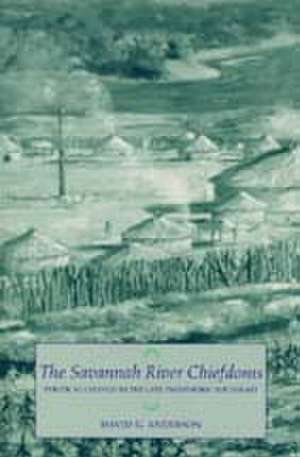The Savannah River Chiefdoms: Political Change in the Late Prehistoric Southeast
Autor David G. Andersonen Limba Engleză Paperback – 29 noi 1994
This volume explores political change in chiefdoms, specifically how complex chiefdoms emerge and collapse, and how this process—called cycling—can be examined using archaeological, ethnohistoric, paleoclimatic, paleosubsistence, and physical anthropological data. The focus for the research is the prehistoric and initial contact-era Mississippian chiefdoms of the Southeastern United States, specifically the societies occupying the Savannah River basin from ca. A.D. 1000 to 1600. This regional focus and the multidisciplinary nature of the investigation provide a solid introduction to the Southeastern Mississippian archaeological record and the study of cultural evolution in general.
Preț: 367.20 lei
Preț vechi: 422.07 lei
-13% Nou
Puncte Express: 551
Preț estimativ în valută:
70.26€ • 73.62$ • 58.09£
70.26€ • 73.62$ • 58.09£
Carte indisponibilă temporar
Doresc să fiu notificat când acest titlu va fi disponibil:
Se trimite...
Preluare comenzi: 021 569.72.76
Specificații
ISBN-13: 9780817307257
ISBN-10: 0817307257
Pagini: 480
Dimensiuni: 156 x 229 x 38 mm
Greutate: 0.86 kg
Ediția:First Edition, First Edition
Editura: University Of Alabama Press
Colecția University Alabama Press
ISBN-10: 0817307257
Pagini: 480
Dimensiuni: 156 x 229 x 38 mm
Greutate: 0.86 kg
Ediția:First Edition, First Edition
Editura: University Of Alabama Press
Colecția University Alabama Press
Notă biografică
David G. Anderson is an Archaeologist with the National Park Service in Tallahassee, Florida.
Recenzii
"This is definitely a contribution to the literature. It is based on sound research and is very detailed and specialized. . . . A major work."
—Charles H. McNutt, Memphis State University
"Useful as a general introduction to the variety of factors that relate to cycling and to the Mississippian development of the Southeast in general. An excellent presentation of the era."
—American Antiquity
Descriere
This volume explores political change in chiefdoms, specifically how complex chiefdoms emerge and collapse, and how this process—called cycling—can be examined using archaeological, ethnohistoric, paleoclimatic, paleosubsistence, and physical anthropological data.
